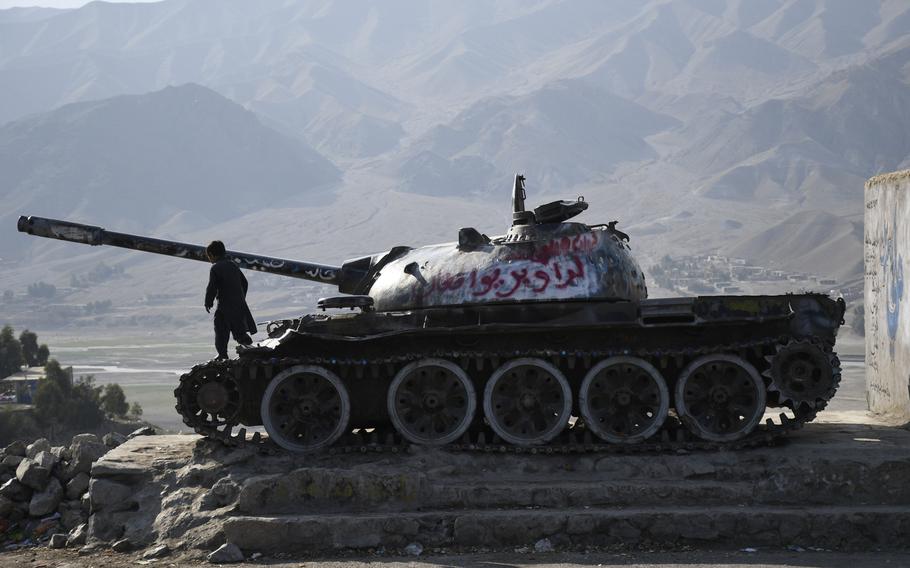
A boy plays on an abandoned Soviet tank on a side of a highway east from Kabul, Afghanistan, on Feb. 22, 2020, the first day of a declared period of reduced violence in the country. Afghanistan in the month afterward saw a surge in violence. (J.P. Lawrence / Stars and Stripes)
KABUL, Afghanistan — The Biden administration has urged Kabul to form a temporary power-sharing government with the Taliban and proposed a multinational peace conference, according to a letter by Secretary of State Antony Blinken published in Afghan media reports.
The letter to Afghan President Ashraf Ghani states that the U.S. is still considering whether to withdraw its remaining 2,500 troops by May 1 under the terms of a deal struck last year between the Trump administration and the Taliban.
But U.S. diplomats have reached “an initial conclusion” to “accelerate peace talks,” Blinken said in the letter, which was first reported Sunday by Kabul’s Tolo News.
“I am making this clear to you so that you understand the urgency of my tone,” Blinken said in the three-page letter.
The State Department declined to comment on the letter, which an Afghan government official confirmed was delivered to Ghani’s office last week.
A State Department official said in a statement that that “all options remain on the table” regarding the withdrawal of U.S. troops.
Blinken’s letter accompanied a U.S. peace plan proposing a cease-fire and the creation of a government that includes the Taliban.
Blinken also proposed that the United Nations convene a meeting of foreign ministers and envoys from the U.S., Russia, China, Iran, Pakistan and India to consider how to support the peace process.
Under the proposal, a temporary government would suspend the existing parliament and abide by the 2004 constitution until it can be revised. A national election would follow to replace the interim government.
“The peace government proposal is a lot more involved and ambitious than anything we have heard about in the past,” said Asfandyar Mir, an analyst at the Center for International Security and Cooperation at Stanford University. “It proposes power-sharing on terms favorable to the Taliban and requires major factions of the republic to fold into one.”
The plan also calls for a 90-day reduction in violence. Afghan negotiators have said that a cease-fire is necessary to convince the Taliban to take peace negotiations seriously.
Both the government in Kabul and the Taliban are likely to object to the ambitious goals laid out by the U.S., said Michael Kugelman, deputy director of the Asia Program at the Wilson Center in Washington.
“The U.S. appears to think it can overcome red lines on both sides,” said Kugelman. “It calls for a new and inclusive government that Ghani has repeatedly rejected.
“And it calls for the Taliban to reduce violence, even though the insurgents say they’ll only talk about lowering violence once U.S. troops have left.”
The letter to Ghani noted that a U.S. military departure by May 1 would lead to “rapid territorial gains” by the Taliban. The U.S. has accused the Taliban of maintaining links with al-Qaida and other actions that have failed to meet the commitments of last year’s peace deal.
“The question is whether it’s meant as a bluff — an effort to scare Ghani into playing ball with the U.S., with the threat of a troop pullout if he doesn’t — or if it’s a genuine acknowledgement that the U.S. hasn’t ruled out honoring that deadline,” Kugelman said.
The next step would be up to Ghani, who strongly opposes the idea of a non-elected interim government.
“If Ghani doubles down and digs in, there could be a fresh political crisis in Kabul, and the U.S. plan could be even harder to pull off,” Kugelman said.
Zubair Babakarkhail contributed to this report.
lawrence.jp@stripes.com Twitter: @jplawrence3